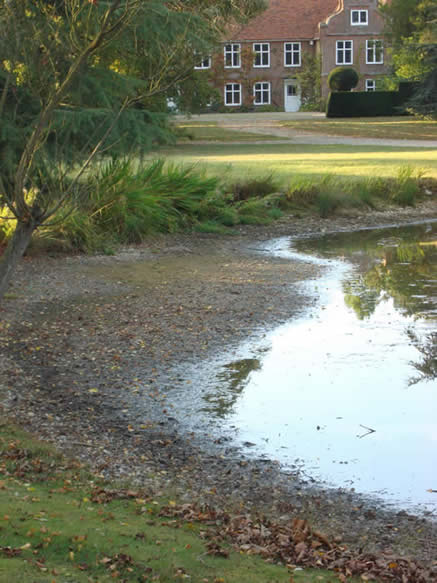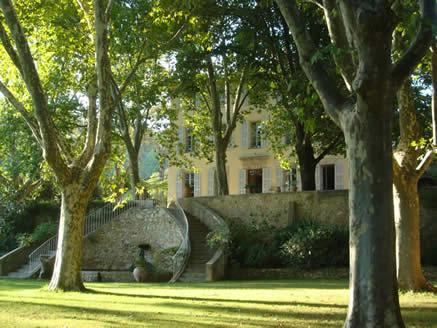In dew time
30 September 2009
I’m always baffled by dew and its effect on plants. It comes, of course, on clear and relatively cold nights, recently almost every night - which is odd because, though the sky has been a sea of stars, the temperature has not dropped as you would expect.
There is nothing mysterious about the process: the ground surface radiates its stored heat into the atmosphere, making it colder than the moisture-laden air, which condenses in drops – especially on grass. The quantities are not large, the equivalent of perhaps half a millimetre of rain at most. In drought conditions, though, when plants are under serious stress, it makes a difference.
Fire alarm
26 September 2009
‘When they’ve finished the duckpond, can they have the moat?’ said the voice on the telephone at midnight. I recognized the voice: a neighbouring farmer’s. ‘Haven’t you heard?’ (the standard Essex formula for breaking news) ‘the coachhouse is on fire.’ The coachhouse is 400 yards away at the other end of the village. By this time I had opened a curtain to look towards the duckpond. It was invisible for flashing blue lights. We pulled on clothes and dashed out. There were three fire engines drawn up by the water, their engines throbbing, and a tangle of fat hoses leading out of the gates and down the street. The sky at the far end was brilliant orange and full of sparks.
When we reached the coach house the roof had fallen in and waves of pale flame were attacking the gables. Five more fire engines were throwing water at it. A man on a tall ladder held the hose from the village mains supply, issuing an ineffectual dribble. The duckpond was providing full jets from the other hoses.
An hour later the flames were under control and we went back to see fish floundering, as we expected, on the bottom of an empty pond. The level was down perhaps two feet, but there was a little way to go. The moat, happily, had not been needed at all.
Faites simple
22 September 2009
What is the absolute minimum that can constitute a totally satisfying garden? I found an answer last week in that paradisiacal part of France they call La Provence Verte, a region of pines and vines at an altitude that gives cold nights summer-long, very different from the sun-baked grey-brown garrigues of the country round.
We were staying with friends in one of those tall, almost urban-looking chateaux of the early nineteenth century, classical, well-proportioned, unornamented and a touch severe. The walls are a pale ochre, the shutters blue-grey. The garden is on two levels; that of the house and, linked to it by two stone staircases curving symmetrically round an oval bassin, a lower terrace, a simple lawn. Both terraces are surrounded by stone balustrades.
The upper terrace, the space in front of the house, is a plain unbroken expanse of
|
The difference appears greatest where sunshine doesn’t evaporate it next day. There are patches of shade in this garden now where the grass has started to grow quite strongly, lush and damp all day. Paradoxically these are places that remain covered from the clear sky at night, where the dew falls must be less. Evaporation therefore seems more important in the equation than precipitation.
On the North Kent Downs where I was brought up dewponds were common. They consisted of shallow hollows perhaps 20 feet across and four or five deep, lined with flints, handsomely built and apparently ancient. They seemed to hold more fallen leaves than water. Apparently they were lined first with clay, then with a thick layer of straw, then with chalk, crushed fine and rolled to a smooth surface, before the flints were applied to protect it. The principle was to insulate the pond from the ground beneath and its radiation of heat; to make it a cool dish to attract condensation on clear nights. But a shower of rain, I’m sure, was even more welcome.

Why am I recalling this now? (It happened in April). Because now, after a dry summer, the duckpond is lower than we have seen it in 40 years. You can walk to the island. When you empty a long-standing reservoir (and this has been here for centuries) can you be sure it will ever fill up again?

that almost dust-fine gravel we don’t seem to know in England – but then we don’t play boules. It is shaded by four towering plane trees and one lime. The lawn below has four more planes, contemporary, I dare say, with the house.
The only flowers are red geraniums in tall oil jars in a row across the façade. Does the gravel sound anticlimactic? It is serene. Gardening consists of keeping it clean, dragging a sort of harrow consisting of chains over it, to efface the marks made by the boule-players. The play of light and shade do the rest.
|